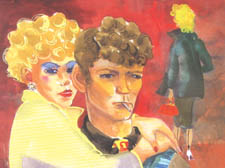|
|
 |
| |

Teddy Boy With Matches And Girl, by Margareta Berger-Hamerschlag |
Embracing feral youth of the 50s
A new book tells how a German-speaking teacher attempted to tame rebellious post-war youngsters in north London, writes Peter Gruner
BEYOND THE JIVING
By Mel Wright. Deptford Forum Publishing
BLOOD is flowing and Britain is embroiled in a moral panic with teenage gangs running amok with flick-knives, razors, bicycle chains, knuckle-dusters and bottles.
No, we are not talking about the gang-and-knife-crime-ridden streets of London in 2008. This is post-war 1950s Britain, where disaffected youth were regularly slashing and occasionally killing each other.
A fascinating new book, Beyond the Jiving, by Mel Wright, tells the story of Hampstead artist and radical Margareta Berger-Hamerschlag, who tried to communicate with these often disturbed and alienated teenagers through her work as a teacher.
It was the era of vast London slums and bombsites and homes not fit for heroes; of dandified Teddy Boys dressed in drape jackets, dark shades, and “brothel-creeper” shoes, with hair greased back in a quiff.
These youngsters were the first so-called teenagers, who lived to jive to rock’n’roll. But cross them and they could flick open a knife.
Margareta was an Austrian immigrant and socialist who came to London to escape the Nazis just before the outbreak of war.
As well as exhibiting with the Hampstead Society of Arts she taught painting and drawing to mainly working-class youth in the backstreets of Kilburn and Paddington.
Mel Wright, who researched the life of teacher Margareta, discovered from her own writings, including one published book, that she worked in a blackboard jungle. Her German accent didn’t help, so soon after the war, and she faced threats and intimidation from many of her young pupils. In one incident a broken milk bottle was pushed close to her face by an angry young Ted, and she regularly faced intimidation from local gangs.
When she brought in fruit and vegetables for still-life drawing classes she would turn her back and it would be gone. The class mainly slouched about and the girls shrieked with laughter at the boys’ dirty jokes.
Troublemakers threw missiles, lit matches, and smeared paint on each other. They stole pencils and rubbers and broke windows. One pupil said he just wanted to join the army and kill people.
But, despite it all, Margareta remained stoical and oozed empathy for her pupils instead of resentment. She described them as “living from day to day, from minute to minute, feeling a grudge against the world that they don’t get what is due to them. These misdemeanours are their primitive revenge.”
This is a book with many resonances with today. Margareta blamed the education system and its obsession with “brain knowledge” for turning out juvenile delinquents with no stake in society. She wanted to see more priority given to arts and creative expression, which she believed was vital to young people, to give a balance to their lives and provide an antidote to the rising wave of materialism.
Wright says: “Her classes included rowdy, jiving Teddy Boys and girls. They were taken aback by her brave insistence that they widen their view of the world and she got them drawing and painting.
“Most of them fiercely resisted, some begrudgingly conceded and a few flourished.”
But despite the sheer frustration, Margareta’s most engaging accomplishment was her understanding of these young people and her compassionate and touching interest in them.
“As a result she became their confidante and supporter, listening and learning about their harsh family lives,” Mel Wright adds. “Through her diary, writings, drawings and paintings, her work stands as a remarkable and moving social record of working class youth in post-war London.”
This short book with illustrations can only give a taste of its subject. Sadly, Margareta died at the age of 56 in 1958. Mel Wright says she has been largely forgotten in the past 50 years and deserves to be rediscovered. She provides understanding of a different more caring way of dealing with the disparate young.
 |
 |
|
 |
 |
|
 |
|



